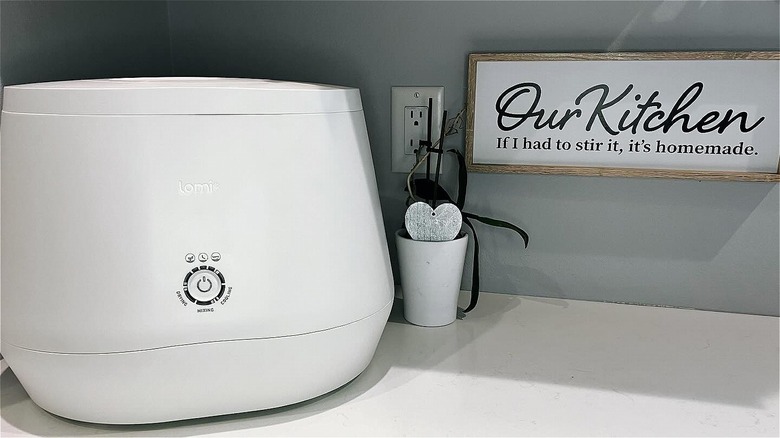Should You Invest In A Kitchen Countertop Composter? Here's What We Know
Composting at home is a smart way to reduce food waste — and your carbon footprint. Plus, you can use the resulting fertilizer to feed the soil in your garden, which may lead to healthier plants. This raises a very important question: Should you buy a kitchen countertop composter or resort to other methods? The answer depends on your individual needs and the type of composter used.
Lomi and similar gadgets break down and dehydrate meat, fruits, veggies, grains, and other food products. Other models, such as the Reencle Home Composter, use patented microbes to process food waste. A full cycle requires 1 to 1.5 kilowatt-hours of electricity, which, according to the Family Handyman, is the equivalent of running a portable heater for at least an hour.
These home appliances make composting a breeze. All you need to do is fill them with food scraps, press a button, and wait until the compost is ready. Manufacturers say you don't have to worry about bad smells because their products have activated filters. The downside? Most kitchen composters are quite expensive, bulky, and less effective than one would expect.
Think twice before buying a kitchen countertop composter
Composting requires a mix of nitrogen- and carbon-rich materials, such as food scraps and dry leaves, as well as oxygen and moisture. The microbes in soil decompose organic matter, turning it into a natural fertilizer. Countertop composters simply cannot replicate this process. "Like a composter, we are turning organics basically back into dirt," Jud Cummins, the director of category and product at Vitamix, explained in an interview with The Guardian. "The output itself is certainly not compost, but we're trying to create the connection for the consumer." Simply put, you can't use the finished product to feed your soil.
Then, there's the price. These gadgets cost $400 or more, and you also need to factor in the price of pods, filters, compost starters, and other consumables. Another problem is the smell. Despite what the manufacturers say, the output from kitchen composters may have a foul odor. For example, composted fish waste will most likely smell like, well, fish. You could always try to mask the smell, or make sure to dispose of your kitchen compost product every two to three days.
On top of the smell problem, most composters take up a lot of space and may not be suitable for small kitchens, and another drawback is that you may see an increase in your utility bills. Countertop composters use electricity, and the cost can add up over time. Also, consider the electricity needed to produce and dispose of them. From this perspective, traditional composting methods are a lot more sustainable.
Electric composters have their perks
One advantage of countertop composters is that they decrease food waste volume by around 80%. This could reduce the number of trips for garbage trucks — and their associated carbon footprint. But from a practical standpoint, you might be better off using compost bins. Depending on the model, these devices are often cheaper, easier to maintain, and more sustainable than their electric counterparts.
However, there's no denying that electric composters can make life easier. Most models work with the touch of a button, eliminating the legwork of creating your own compost. This aspect alone can save you hours each week. Additionally, rodents and other pests can't make their way into the composter. Therefore, you won't have to use wire mesh or other pest control methods. Another advantage is that you can compost year-round, no matter the weather. So, if you live in a cold climate, you can still process your food waste.
But again, these appliances don't actually make traditional compost. What you can do is sprinkle the resulting product into your garden — though it's unlikely to improve soil quality. Alternatively, put it in a green bin, just like you do with other food scraps. At the very least, you'll save space and dispose of the trash more easily.


